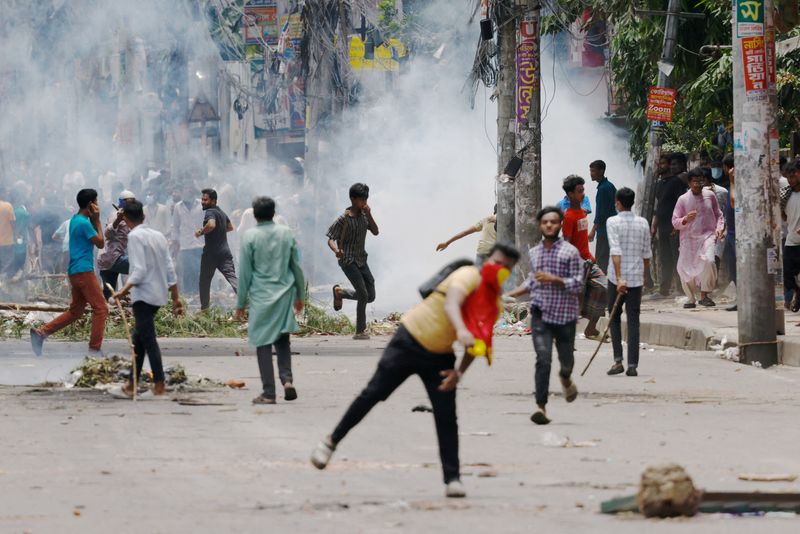By Ruma Paul and Tora Agarwala
DHAKA (Reuters) – Bangladesh Prime Minister Sheikh Hasina imposed a nationwide curfew final week and used the military to quell protests towards job quotas that killed practically 150 folks, however anger towards her authorities doesn’t appear to have abated.
The protests, which began in universities and faculties earlier this month, rapidly become a extra widespread agitation towards Hasina and her authorities.
Police fired rubber bullets, tear fuel and lobbed sound grenades to disperse tens of 1000’s of protesters who got here out on the streets. The federal government denied any dwell rounds have been fired, however hospital sources stated useless and injured folks had wounds from bullets and shot gun pellets.
Rights teams and critics say Hasina has turn out to be more and more autocratic throughout her final 15 years in energy and her rule has been marked by mass arrests of political opponents and activists, pressured disappearances and extrajudicial killings, expenses she denies.
Badiul Alam Majumdar, the secretary of Shushahoner Jonno Nagorik, a Dhaka-based civil society platform for good governance, stated the protests have been “just the tip of the iceberg” and the usage of pressure towards college students will breed additional discontent towards Hasina’s authorities.
“People are being deprived of their basic rights, with a significant lack of human rights and justice. They can’t cast their votes freely,” he stated. “This widespread frustration and anger among the people is evident in the protests.”
Authorities official weren’t instantly accessible for remark. However officers have stated beforehand no college students have been concerned in arson or violence, and as a substitute blamed opposition events.
Hasina, 76, first led her Awami League occasion to victory in elections in 1996, serving one five-year time period earlier than regaining energy in 2009, by no means to lose once more.
She gained a fourth straight time period in workplace in January elections that have been boycotted by the primary opposition occasion and likewise marred by lethal protests.
Whereas Hasina managed to beat discontent and return the nation in the direction of some normalcy this week, it is not going to be “business as usual” going ahead, stated Zafar Sobhan, the editor of English each day Dhaka Tribune.
“This crisis shows that the government needs to listen to the young people of the country and take their concerns seriously,” stated Sobhan, including that the quota difficulty served as a proxy for a number of different key points.
“The government has been put on notice that enough is enough and it needs to address the legitimate concerns of the public,” he stated.
‘MURDERS SHOULD BE INVESTIGATED’
Asif Mahmud, a pupil chief, instructed Reuters that he was kidnapped and abused by authorities for 4 days after which dumped on the street this week. His allegations couldn’t be independently verified and authorities officers couldn’t be instantly reached for touch upon a vacation.
“There have been killings, nobody is addressing that,” Mahmud stated. “These murders should be investigated. Those who ran this massacre, we will demand their prompt punishment.”
The United Nations, worldwide rights teams, the U.S. and Britain have criticised the usage of pressure and requested Dhaka to uphold the appropriate to peaceable protests.
Hasina stated she was pressured to impose the curfew to guard residents and state property, blaming the primary opposition Bangladesh Nationalist Occasion (BNP) and the Jamaat-e-Islami occasion for the violence, expenses they denied.
Tarique Rahman, the exiled performing chairman of BNP, stated that Hasina was concerned in “mass murder” in the course of the protests.
The daughter of the nation’s founding father Sheikh Mujibur Rahman, who led Bangladesh’s independence from Pakistan, Hasina has been credited with turning across the financial system and the huge clothes business.
However the financial system has additionally slowed sharply for the reason that Russia-Ukraine battle pushed up costs of gasoline and meals imports, forcing Bangladesh to show final 12 months to the Worldwide Financial Fund for a $4.7 billion bailout.
Consultants have blamed the newest unrest on stagnant job progress within the personal sector and excessive charges of youth unemployment which have made authorities jobs, with their common wage hikes and different privileges, extra engaging.

Failing to tame inflation, which presently hovers round 10%, and unemployment was not on account of a dearth of choices however reasonably on account of a scarcity of political will, the consultants stated.
“One critical policy approach could have been to increase investment into the services sectors like health and education where it would be possible to create more decent jobs, especially for the educated and relatively young people,” stated Mohammad Abdur Razzaque, chairman of Dhaka assume tank Analysis and Coverage Integration for Growth.




